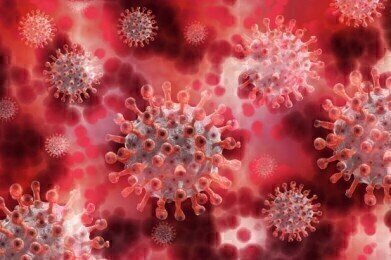News
Isolation Technique Could be Key for COVID Drug Discovery
Apr 28 2021
Researchers at the University of Birmingham working on extraction of the COVID-19 encounter complex in a form stable enough for identification of future drug target sites, have successfully used polymer-based molecular ‘cookie cutters’ to isolate the complex while keeping it embedded in the cell membrane, so preserving the full structure of the molecule in its original context.
The encounter complex is formed when the COVID-19 spike latches onto a binding site on an ACE-2 receptor, which is a complex protein embedded in cell membranes in the lungs and cells that line the nose and airways.
Although it was first isolated last year, the methods used involved full extraction of ACE-2 receptors from cell membranes; this removal of the membrane’s supportive structure affects the stability of the receptor, which makes it difficult to study its structure and function.
The cutting technique, invented by Professor Tim Dafforn from the university’s School of Biosciences, has enabled researchers at the Universities of Birmingham and Oxford to extract what they believe is the first ever COVID-19 encounter complex with an intact membrane. The polymers used for the process are called Styrene Maleic Anhydrides (SMAs) and the resulting structure is known as an SMA lipid particle (SMALP), as it includes lipids from the cell membranes, enough for identification of potential druggable sites.
This initial project, which was funded by UKRI/BBSRC COVID-19 Rapid Response funding, also includes characterising the complex with a view to publishing its structure. The researchers also received funding from Innovate UK that will enable a wider team to determine which area of the complex will be the most effective for anti-viral drug discovery efforts.
The SMAs used in the study were provided by Netherlands-based company Orbiscope, a business unit of world-leading SMA producer Polyscope Polymers BV.
Dr Bart Verbraeken, Business Unit Manager Orbiscope, said: “Beyond COVID-19, we believe SMAs have huge potential to unblock constrictions in the drug pipeline, by enabling studies of receptors in their native environments that will define drug targets more precisely than ever before.”
More information online
Digital Edition
Lab Asia Dec 2025
December 2025
Chromatography Articles- Cutting-edge sample preparation tools help laboratories to stay ahead of the curveMass Spectrometry & Spectroscopy Articles- Unlocking the complexity of metabolomics: Pushi...
View all digital editions
Events
Jan 21 2026 Tokyo, Japan
Jan 28 2026 Tokyo, Japan
Jan 29 2026 New Delhi, India
Feb 07 2026 Boston, MA, USA
Asia Pharma Expo/Asia Lab Expo
Feb 12 2026 Dhaka, Bangladesh



















